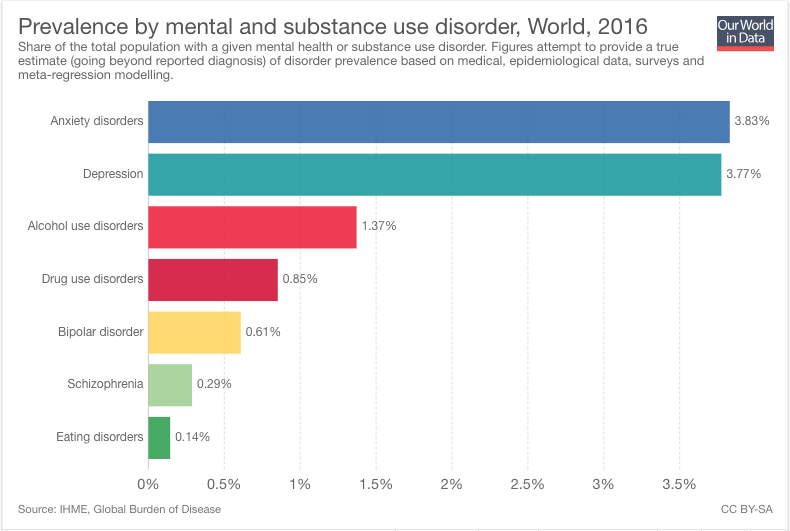This is the world's biggest mental health problem - and you might not have heard of it

An estimated 275 million people suffer from anxiety disorders. Image: REUTERS/Arko Datta

Get involved with our crowdsourced digital platform to deliver impact at scale
Stay up to date:
Neuroscience
The early years of the 21st century have witnessed a worldwide epidemic of poor mental health and related illnesses. But while depression is the condition most will associate with mental health issues, and the leading cause of disability worldwide, it is not the number one mental health concern people face.
That unwanted accolade goes to anxiety.
An estimated 275 million people suffer from anxiety disorders. That’s around 4% of the global population, with a spread of between 2.5% and 6.5% of population per country. Around 62% of those suffering from anxiety are female (170 million), compared with 105 million male sufferers.

Anxiety disorders can follow different courses, but the most commonly experienced symptoms include:
- apprehension – worrying about future misfortunes, feeling on edge, having difficulty concentrating
- motor tension – restlessness and fidgeting, tension headaches, trembling, inability to relax
- autonomic overactivity – lightheadedness, sweating, abnormally high heart-rate (tachycardia) or abnormally rapid breathing (tachypnoea), pain in the upper abdomen (epigastric discomfort), dizziness, and dry mouth
By 2030, the cost to the global economy of all mental health problems could amount to $16 trillion. How the world confronts mental health challenges, which are a blight on a growing number of people’s lives as well as an economic encumbrance, is on the agenda at the World Economic Forum's Annual Meeting 2019 in Davos.
The Duke of Cambridge, Prince William will be attending Davos 2019, where he will talk about Mental Health at Work, his initiative to improve emotional and mental wellbeing in the workplace.
The full extent of mental health disorders is likely to be even higher than the latest data indicate, as it tends to be under-recorded across both the developed and developing worlds. Even those who are diagnosed don't always receive the right treatment. As the World Health Organization notes:
"Health systems have not yet adequately responded to the burden of mental disorders. As a consequence, the gap between the need for treatment and its provision is wide all over the world. In low- and middle-income countries, between 76% and 85% of people with mental disorders receive no treatment for their disorder. In high-income countries, between 35% and 50% of people with mental disorders are in the same situation."
Don't miss any update on this topic
Create a free account and access your personalized content collection with our latest publications and analyses.
License and Republishing
World Economic Forum articles may be republished in accordance with the Creative Commons Attribution-NonCommercial-NoDerivatives 4.0 International Public License, and in accordance with our Terms of Use.
The views expressed in this article are those of the author alone and not the World Economic Forum.
Related topics:
The Agenda Weekly
A weekly update of the most important issues driving the global agenda
You can unsubscribe at any time using the link in our emails. For more details, review our privacy policy.
More on Wellbeing and Mental HealthSee all
Kate Whiting
April 17, 2024
Adrian Gore
April 15, 2024
Fatemeh Aminpour, Ilan Katz and Jennifer Skattebol
April 15, 2024
Andrew Moose and Ruma Bhargava
April 5, 2024
Jacqueline Brassey, Lars Hartenstein, Patrick Simon and Barbara Jeffery
April 3, 2024






